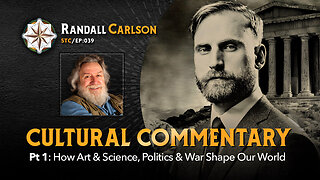Premium Only Content

The Duality of Power and Freedom: A Deep Exploration into Modern Relationships and Gender Dynamics
This video compilation serves as a striking reflection of the multifaceted nature of relationships and gender dynamics in our modern world. Each interaction reveals underlying tensions, cultural influences, and the evolving definitions of power, commitment, and freedom. Through these conversations, we can delve deep into the intricate web of societal expectations, individual autonomy, and the complex dance between tradition and modernity.
#### **I. The Power Struggle: Tradition Versus Modernity**
At the heart of many of the exchanges in this compilation lies a fundamental struggle between traditional values and the evolving roles in contemporary relationships. The concept of "who is the boss of the house" speaks volumes about the shifting balance of power. Traditionally, many cultures placed the man in a dominant role, often as the undisputed leader of the household. This was not just a matter of individual choice but a deeply ingrained societal norm that dictated how families were structured.
However, as we witness in the discussions, this traditional power dynamic is being challenged. The very question of who "wears the pants" in a relationship now triggers a more nuanced conversation about equality, respect, and partnership. In this modern era, power is no longer about dominance but about collaboration and shared responsibility. This shift is not just reflective of changing gender roles but of a broader societal transformation where old hierarchies are being dismantled in favor of more egalitarian relationships.
#### **II. The Influence of Cultural and Societal Expectations**
The conversations also reveal the profound influence of cultural and societal expectations on personal behavior. When a woman discusses dressing modestly out of respect for her partner, it raises questions about the intersection of personal freedom and societal norms. This isn't just about clothing—it's about how individuals navigate the expectations placed upon them by their cultures, communities, and partners.
Cultural norms dictate much of what is considered acceptable or respectable, and these norms are often deeply intertwined with notions of gender and power. The idea that certain behaviors or appearances should be controlled or moderated to maintain respect within a relationship highlights the ongoing struggle for balance between personal autonomy and the expectations of others.
Moreover, the influence of media and societal narratives on relationships cannot be understated. The portrayal of men and women in mass media often reinforces stereotypes that shape our understanding of love, attraction, and fidelity. These narratives contribute to the expectations we place on ourselves and our partners, sometimes leading to unrealistic standards or superficial judgments.
#### **III. Commitment, Loyalty, and the Quest for Authenticity**
As we explore the discussions around infidelity, loyalty, and the nature of modern relationships, it becomes clear that the quest for authenticity is central to the challenges many face today. The notion of "guilt-free passes" in relationships, the attraction to celebrities or public figures, and the underlying currents of dissatisfaction all point to a deeper yearning for connection and fulfillment.
Modern relationships are often marked by a paradoxical blend of freedom and commitment. On one hand, there is a growing acceptance of personal freedom and the right to pursue one's desires. On the other hand, there remains a strong desire for stability, loyalty, and deep emotional connection. Balancing these seemingly contradictory impulses requires a new level of communication, understanding, and emotional intelligence.
The conversations also touch upon the idea that some people might offer only what they believe others expect of them, rather than their true selves. This raises a critical issue in relationships: the importance of authenticity. In a world where superficial interactions are often the norm, the search for genuine, meaningful connections becomes all the more vital.
#### **IV. The Philosophical Underpinnings: Freedom, Responsibility, and the Human Condition**
Beneath the surface of these discussions lies a deeper philosophical question about freedom and responsibility. What does it mean to be free in a relationship? How do we balance our individual desires with our responsibilities to others, especially within the context of a committed partnership?
The existentialist philosopher Jean-Paul Sartre famously said, "We are condemned to be free," highlighting the burden of choice in the human condition. In relationships, this freedom comes with the responsibility of choosing how to act, how to treat others, and how to navigate the complex interplay of desires, expectations, and moral obligations.
The interactions in this video compilation bring to light the tension between the freedom to act according to one's desires and the responsibility to maintain the integrity of a relationship. They challenge us to think critically about the ethical dimensions of our choices and the impact they have on the people we care about.
#### **V. Conclusion: Towards a Deeper Understanding of Human Relationships**
This compilation of video clips is more than just a glimpse into modern relationships—it's a window into the evolving human condition. It forces us to confront the realities of power, freedom, commitment, and the ways in which societal expectations shape our lives. By reflecting on these conversations, we can gain deeper insights into the nature of love, respect, and the ongoing struggle to find balance in a rapidly changing world.
In the end, the true challenge in modern relationships lies not in adhering to traditional roles or breaking free from them, but in navigating the complex and often conflicting demands of authenticity, freedom, and commitment. These conversations remind us that relationships are not static—they are dynamic, ever-evolving processes that require continuous reflection, adaptation, and growth.
By engaging with these ideas, we can move towards building relationships that are not only resilient and fulfilling but also deeply aligned with our values and true selves.
-
 1:50
1:50
FragmentsOfTruth
14 hours agoDied Over $539: The Tragic Cost of American Healthcare
931 -
 1:17:59
1:17:59
Sarah Westall
8 hours agoDOGE: Crime & Hysteria bringing the Critics & the Fearful - Plus new CDC/Ukraine Crime w/ Dr Fleming
31.2K3 -
 45:39
45:39
Survive History
13 hours ago $3.76 earnedCould You Survive in the Shield Wall at the Battle of Hastings?
38.7K5 -
 1:50:28
1:50:28
TheDozenPodcast
12 hours agoViolence, Abuse, Jail, Reform: Michael Maisey
82.3K4 -
 23:01
23:01
Mrgunsngear
1 day ago $4.41 earnedWolfpack Armory AW15 MK5 AR-15 Review 🇺🇸
72.5K12 -
 25:59
25:59
TampaAerialMedia
1 day ago $2.26 earnedUpdate ANNA MARIA ISLAND 2025
44.2K4 -
 59:31
59:31
Squaring The Circle, A Randall Carlson Podcast
14 hours ago#039: How Politics & War, Art & Science Shape Our World; A Cultural Commentary From Randall Carlson
34.1K3 -
 13:21
13:21
Misha Petrov
14 hours agoThe CRINGIEST Thing I Have Ever Seen…
27K53 -
 11:45
11:45
BIG NEM
10 hours agoWe Blind Taste Tested the Best Jollof in Toronto 🇳🇬🇬🇭
18.7K1 -
 15:40
15:40
Fit'n Fire
13 hours ago $0.38 earnedArsenal SLR106f & LiteRaider AK Handguard from 1791 Industries
16.3K1